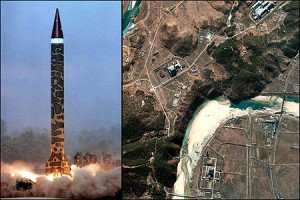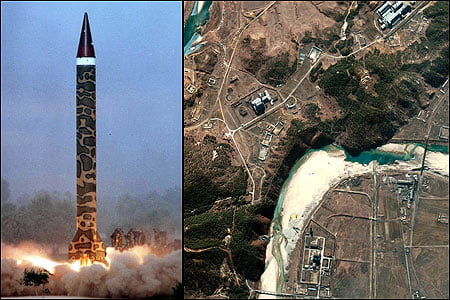2012-10-08 By Richard Weitz
At the 2012 Moscow Nonproliferation Conference, most attention on bringing the Comprehensive Test Ban Treaty (CTBT) into force focused on how to secure U.S. ratification of the treaty.
The participants from other countries found it convenient to blame Washington’s stubbornness for the CTBT’s failure to enter into force. Although convenient, this stance neglects that other countries have also failed to ratify the treaty.
The Clinton administration played an active role in drafting the CTBT. The United States signed the CTBT on September 24, 1996, the first day the accord was available for signature.
During and after the negotiations, the President Clinton affirmed that the Stockpile Stewardship Program, which employs advanced computers and nonnuclear experiments to ensure the reliability of U.S. nuclear weapons, and other “safeguards” could enable the United States to cease nuclear weapons testing without compromising the effectiveness of its nuclear deterrent.
The Clinton administration had hoped to use the momentum generated by the April 1998 British and French treaty ratifications to secure Senate approval of the CTBT, but the Senate refused to provide its advice and consent on October 13, 1999, when the treaty was briefly considered.
The Clinton administration nevertheless informed other governments that Washington would continue to abide by the CTBT and refrain from further nuclear weapons testing.
Although the George W. Bush administration did not resume testing, its members sought to avoid foreclosing that option through CTBT ratification in case developments required renewed testing.
For example, the White House told the Congress in 2007 that, “While supporting the continued voluntary moratorium on testing, the Administration strongly opposes… calls for the ratification of the CTBT. It would be imprudent to tie the hands of a future administration that may have to conduct a test of an element of an aging, unmodernized stockpile in order to assure the reliability of the nuclear deterrent force.”
Bush administration officials also considered the CTBT consider unverifiable and ineffective at curbing nuclear proliferation or nuclear terrorism. U.S. government officials stopped attending the biennial Article XIV conferences aimed at facilitating the CTBT’s entry into force. The Bush administration nonetheless urged countries to refrain from testing nuclear weapons and took other measures to avert the proliferation of nuclear and other weapons of mass destruction.
The Bush administration unsuccessfully sought congressional funding to research and develop new nuclear warheads that might require testing to prove their effectiveness.
The administration did make some progress in reducing the preparation time needed to conduct another U.S. nuclear test should the United States decide to do so.

CTBT signatories are obliged to make annual contributions—in accordance with the standard UN assessment scale—to support the CTBTO Preparatory Commission, whose yearly costs approximate $100 million. Even so, Bush budget submissions to Congress only requested funding for PrepCom activities related to the International Monitoring System (IMS), not for other CTBT-related activities. For example, the administration did not seek funds for developing the on-site inspection capacity, which would begin operating only if the CTBT enters into force. The continual arrears in U.S. funding starting in early 2003 resulted in repeated short-term suspensions of U.S. voting rights on the Commission.
The Bush administration viewed the CTBTO monitoring network as useful in supplementing the U.S. Atomic Energy Detection System (USAEDS) for detecting and assessing possible nuclear explosions. The IMS—which has required an investment of more than $1 billion to construct, maintain, and modernize—has monitoring stations in or near China, Russia, and other geographic regions where USAEDS coverage is weak. The United States, like other governments that have signed the CTBT, can receive any data generated by the IMS even without the CTBT’s entry into force. The National Nuclear Security Administration of the Department of Energy, the Department of Defense, and other U.S. government agencies have meanwhile continued researching techniques and technologies for detecting nuclear explosions.
The Barack Obama administration has consistently called for U.S. Senate ratification of the CTBT.
The administration did not actually secure formal Senate reconsideration in its first term. According to Daryl Kimball, who spoke at the Moscow conference, not only did the administration want a new intelligence assessment confirming the CTBT could be verified and that ratification would not threaten U.S. security, it also made security the New START agreement a priority since the expiration of the original START accord in December 2009 left a gap in Russian-U.S. nuclear weapons verification.
The Obama Administration has sought to established conditions favorable for securing ratification at some point. For example, it has not developed new nuclear weapons or modified existing ones. Its Nuclear Posture Review also calls for reducing the role of nuclear weapons in U.S. national security policy and eventually eliminating them altogether, albeit only under very strict conditions of universal verifiable nuclear disarmament.
The Obama administration and other advocates of the CTBT argue that comprehensively ending nuclear testing through the treaty’s adoption would constrain vertical and horizontal nuclear proliferation since states would become less inclined to incur the financial and other costs of researching, developing, and deploying sophisticated nuclear weapons whose efficacy could not be verified through field tests.
They also believe U.S. ratification yield specific benefits to the United States—such as by helping restore American global arms control leadership. Supporters of the NPT consider the CTBT as a step towards the de-legitimization and eventual elimination of nuclear weapons, which would end the current discriminatory practice by which a few NPT members are permitted to possess nuclear weapons while others cannot. The 1995 NPT Review Conference only consented to extend the NPT indefinitely after the parties committed to negotiate a universal and comprehensive nuclear test ban treaty.
Furthermore, they argue that, by ratifying the CTBT, the United States will exert greater influence in the development and operations of the IMS, and the CTBTO more generally, than by remaining a non-member.
American supporters of the CTBT also deny that ratification would impose additional costs on U.S. security given that the United States has already signed the treaty, has developed what they consider an effective program for maintaining the reliability and effectiveness of the U.S. nuclear stockpile even without testing or developing new nuclear weapons, and has accordingly unilaterally adhered to the accord’s prohibition against nuclear testing.
As the United States is already constraining its nuclear behavior in conformity with the treaty, and has no compelling reason to withdraw from the treaty and resume nuclear testing, they reason Washington might as well formally ratify the accord in order to realize its reputational, diplomatic, and other benefits.
The Democratic Party platform calls for Senate ratification of the CTBT.
If reelected, the Obama administration is expected to make its approval by the United States and other countries a major focus of its arms control agenda in 2013-16. The Republican Platform does not mention the treaty, and Governor Mitt Romney has also not indicated his views regarding ratification.
Leading Republican foreign policy experts have offered varying opinions regarding the CTBT.
Although John McCain and other Senators who voted against U.S. ratification in 1998 have expressed a willingness to approach the CTBT with an open mind, they might link their support on this occasion to certain conditions.
In 2001, for instance, General John Shalikashvili, former chairman of the Joint Chiefs of Staff, proposed that the United States could ratify the CTBT with the stipulation that every ten years it would reassess if the treaty still contributed a net benefit to U.S. security, allowing for possible withdrawal if the calculation yielded a negative result. In November 2007, Harold Brown and John Deutch, who both held senior U.S. national security positions in previous administrations, proposed that the United States support a CTBT that would renew every five years rather than every ten years as provided for in the current text.
Yet, the adoption of some conditions could reduce support for the treaty among current supporters. For example, arms controllers would object to linking CTBT ratification to a commitment by the administration to proposing new U.S. nuclear weapons research and development programs. Indian leaders have already cited foreign attempts to link the CTBT’s entry into force to India’s ratification as one reason why they have refused to ratify.
Kimball considered ratification possible if Obama were reelected and the Democrats retained a majority in the Senate.
Even then, the Obama administration would need to follow the same successful though resource-intensive strategy it used in 2010 to secure ratification of New START. The president would need to clearly indicate his strong support for ratification, secure supporting endorsements from U.S. military leaders, appoint a high-level coordinator in charge of a high-power ratification team that would aggressively address senatorial doubts, and encourage the Senate to undertake a lengthy and comprehensive examination of the ratification issue.
CTBT supporters hope that U.S. entry would trigger a cascading wave of ratifications, with Beijing following Washington, India following China, Islamabad following New Delhi, and Iran, North Korea, and Indonesia joining the bandwagon so as not to appear the sole hold-out states. For example, the June 2006 report of the Weapons of Mass Destruction Commission states that: “The Commission believes that a U.S. decision to ratify the CTBT would strongly influence other countries to follow suit. It would decisively improve the chances for entry into force of the treaty and would have more positive ramifications for arms control and disarmament than any other single measure.”
Unfortunately, past experience suggests that this hope may not be realized.
Domestic and regional security dynamics often play a greater role in influencing national arms control decisions than do the nonproliferation policies of the United States.
Although China would probably ratify the CTBT if the U.S. Senate does, Egypt and possibly Iran will likely continue to insist that Israel join the NPT first before they will ratify the CTBT. Meanwhile, North Korea is adamantly boycotting the NPT, the CTBT, and other multinational arms control treaties pending resolution of its nuclear status within the framework of the Six-Party Talks, where fundamental disagreements continue to divide the participants.
Many of these governments seem less concerned by the status of the treaty within the United States than whether their neighbors will adhere to the accord.
Some may even want to keep open the option of testing nuclear weapons themselves in the future. Securing their support could require additional international pressures as well as incentives, but even then might prove impossible in the case of some holdouts.
For this reason, Kimball called on the P-5 (the five permanent members of the UN Security Council, which are also the only countries legally permitted by the Nuclear Nonproliferation Treaty to possess nuclear weapons, at least for a while) to consider how the CTBT could enter into force even if one or two of the 44 Annex 2 states refuse to ratify it (to avoid letting them hold it hostage)
He also called other countries to take steps to facilitate U.S. CTBT ratification and reinforce the existing taboo against nuclear testing since it could take a long time for the CTBT to enter into force. For example, the UN Security Council could outline how it would penalize states that engage in new nuclear tests. Furthermore, Russia and China could join the United States in announcing they will not develop new types of nuclear weapons.
Kimball also argued that these three countries should cease engaging in activities designed to further enhance preparations at their former nuclear test sites for renewed testing. Finally they could also begin negotiating and even implementing confidence-building measures to reassure one another that they would not conduct future nuclear tests.
(Editor’s Comment: Nuclear deterrence will become more not less significant in the decade ahead, as new nuclear weapons states as well as weapons are added to the global landscape. To maintain freedom of action in the “global commons,” how will the United States and its allies ensure nuclear deterrence as a front end , not a residual issue?)


